The Chocolate Lab is a friendly, confident and loving dog with great character and huge appeal as a pet. You may have heard rumors that chocolate labs are less intelligent and more prone to health problems than their yellow and black Lab cousins. So we’ll be clearing up a few myths, and finding out if there is more to the chocolate Lab than just fur color!
- Where did chocolate Labs come from?
- Coat color, shades, and easy genetics
- English vs American chocolate Labs
- Traits: What to expect from your chocolate Lab
- Are chocolate Labs stupid?
- Silver vs chocolate Labs
- Finding Chocolate Labrador puppies
- Chocolate Lab training
- Old chocolate Labs
I’ll share my experience of raising and training chocolate Labradors. We’ll look at what you can expect in terms of temperament, behavior, and physical characteristics. And I’ll help you with feeding and training your dog, from puppyhood to old age.
Where do Chocolate Labs come from?
Labrador Retrievers were recognised by the UK Kennel Club in 1903 and by the AKC in 1917. The Labrador breed was developed mainly by a couple of English aristocrats in the 1800s, from dogs they had imported from North America.

Although our early Labrador Retrievers were predominantly black, throughout the history of the breed, chocolate Labrador dogs (sometimes referred to as liver Labradors) have appeared occasionally in litters of puppies.
Way back in the last century, chocolate puppies were sometimes culled at birth! Black Labs were adored, and black was the only color considered respectable for a Labrador.
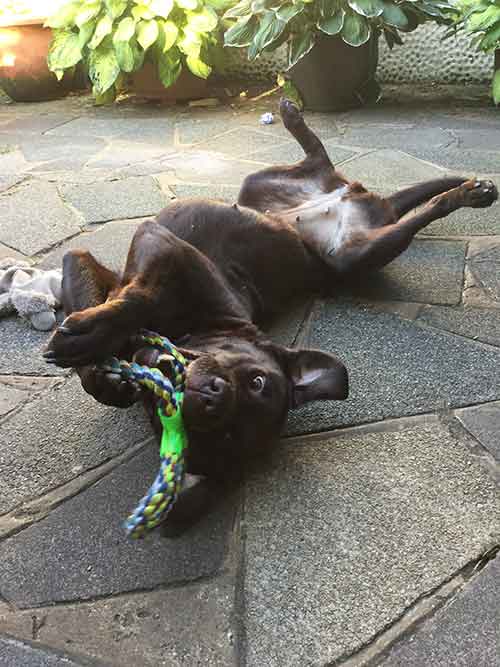
Fortunately those attitudes are well and truly behind us, and in the last few decades the chocolate Lab has gone from strength to strength.
How is the Chocolate Color Inherited in Labradors?
To understand how brown puppies can be born to two black dogs, we need to take a peep at how coat color is inherited in the Labrador retriever.
The instructions that tell your dog what to look like, and what color to be, come packed in genes. And genes come in pairs. This is true for the gene that determines whether or not the Labrador will be brown (this gene is called b) or black (B). Every Labrador has either two genes for a black coat (BB) or two genes for a brown coat (bb) or one of each (Bb).

The color black in Labradors is dominant. That means that if a Labrador has one gene for the color brown, and one gene for the color black, the dog will be black.
The hidden gene
This is because the black gene switches off the brown one. The brown gene remains hidden, doing nothing in particular, while the black gene takes control of fur color.
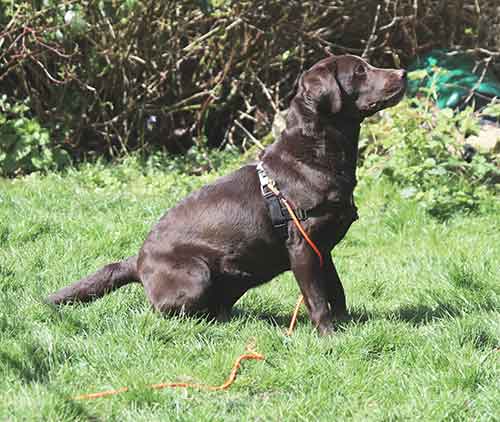
The brown gene only gets to be in charge if it is paired with another brown gene. But a black Labrador can sneakily carry a brown gene (Bb) and pass it along to his children. This is how the color brown can remain hidden in generation after generation of black Labradors.
Chocolate Labrador Shades
Unlike our yellow Labradors – which come in a wide range of shades, the color chocolate is pretty consistent in puppyhood. Most chocolate Labs are quite similar in color, though eye color can vary from gold to dark brown.
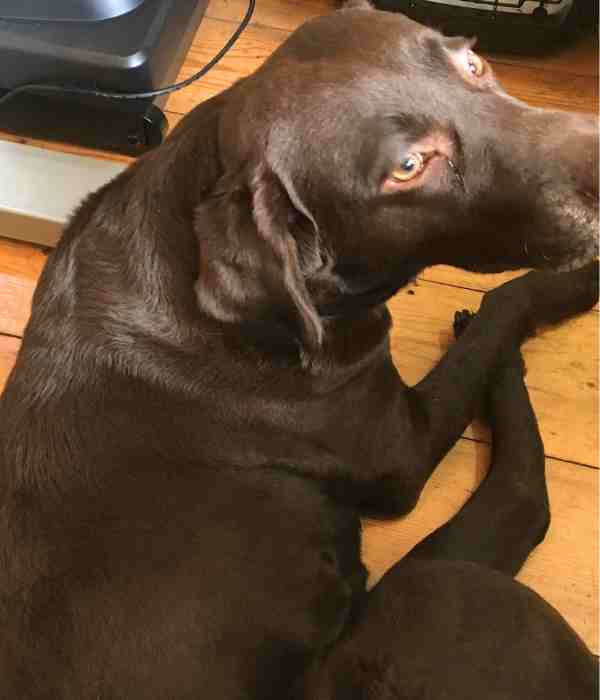
The color of your adult chocolate Labrador Retriever boy or girl’s coat will, however, vary depending on whether the coat is newly grown after a molt, or is about to shed. As the old hair dies it starts to lose some of its color, and the dead hair is much paler than the glossy dark chestnut-colored coat that will soon appear.
And though some chocolate Labs are darker than others, even when taking the stage of molt into account, variations between individuals are fairly small, with one very contentious exception. The Silver Labrador, which is a variation of the chocolate fur color. We’ll be looking a bit more closely at that below.
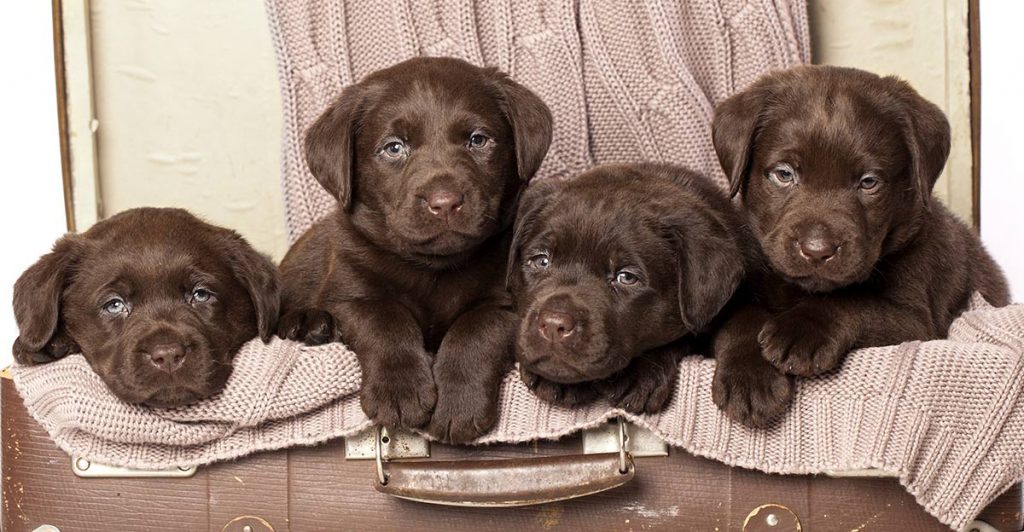
When did Chocolate Labs become Popular?
By the 1920s and 30s a few brown or liver Labradors, as they were then called, were making an appearance on the shooting field. But for some years more, brown was not widely acceptable to Labrador enthusiasts. It wasn’t until the 1960s that brown Labs began to really grow in popularity.
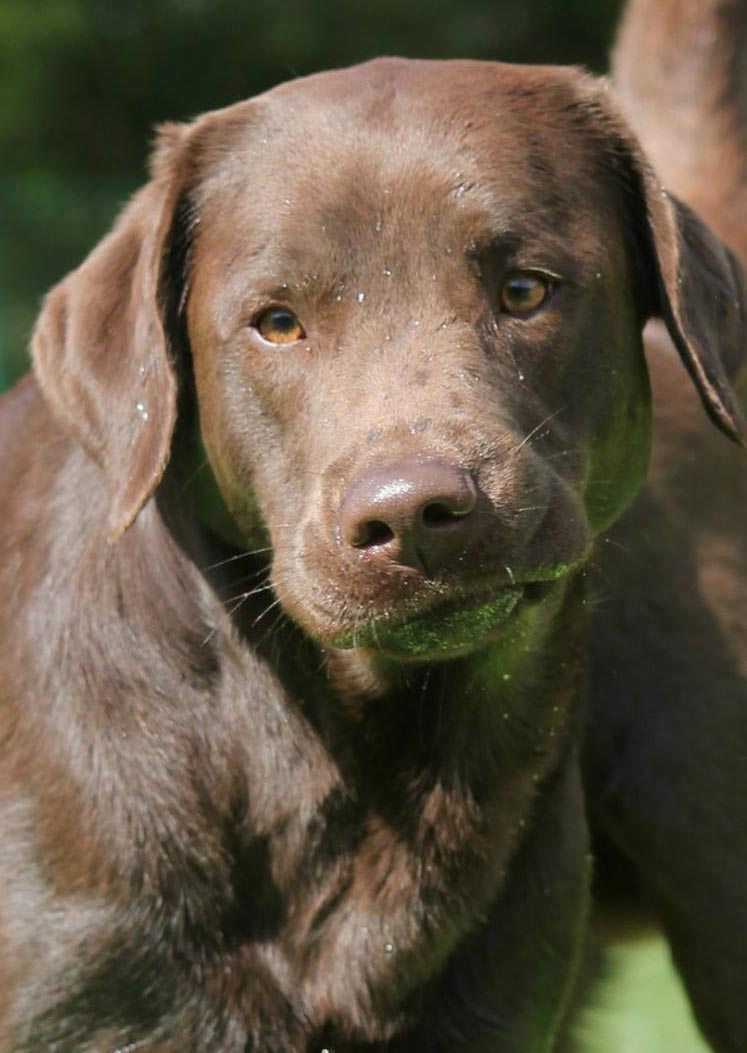
The demand for these beautiful dogs came from ordinary home owners and they much preferred the word ‘chocolate’ to describe their companions.
That preference continues today, and we often name our brown Labs after favorite snack bars and chocolate flavored drinks! You can however still register chocolate Labradors as ‘liver’ in color.
Different Types Of Chocolate Lab
As the popularity of Labs began to expand beyond the shooting community that developed the breed, they began to split into two different types. Those dogs mainly bred for show and companionship. And dogs mainly bred for hunting and retrieving.
English Chocolate Lab
English Labs are those bred for Shows. The first chocolate English Show Champion Labrador Retriever was Cookridge Tango in 1964. The 1960s was a turning point in the popularity of the chocolate Lab, but interest grew slowly at first.
Gradually, the public began to demand more chocolate Lab puppies, and breeders began to produce them. Over the next few decades, Chocolate Labradors became increasingly popular both in the show ring and as pets. In the shooting community, where Labradors were expected to do a job of work, the preference for black continued throughout the late 1900s, and into the present day, particularly in the UK.
American Chocolate Lab
American chocolate Labradors were bred to work, and are also known as field Labradors. The chocolate Lab has now become more established in the working community, but they are harder to find. There is a rumour going around that this is because brown Labradors are a bit stupid! We’ll look at that below.
 Chocolate Lab Characteristics
Chocolate Lab Characteristics
The split that occurred between show lines and working lines of Labrador, affected different colors of Labrador in different ways.
The black Lab remained the popular choice of the hunting fraternity, while the popularity of the chocolate Lab took off largely outside of the hunting community. And the traits or characteristics of chocolate Labs reflect their primary role as pets or companion dogs. As a result there are differences not only in temperament, but also in size and shape.
How Big Do Full Grown Chocolate Labs Get?
Show Labradors (English) are more heavily built, somewhat slower, and physically less agile than their field bred counterparts. Some English brown Labs may reach 80 or 90lbs without being fat or overweight. Whereas American chocolate Labs are often lighter.
My Lab Rachael, for example, weighs less than 60lbs. Most males of her build will weigh five or ten pounds more. English chocolate Labs are also more likely to have a chunky Labrador head and thick otter tail. And while some feel that the chunkiness of the skull has been taken too far in show lines, there is no denying the beauty of a classic Labrador head.
Show Labs also have smaller ears and a wider muzzle. A brown Labrador is more likely to be from these show types of bloodline and are therefore more likely to share these general characteristics. But there is more. It isn’t just body shape that is inherited.

Chocolate Lab Temperament
American Labs may have a more intense retrieve drive, or urge to chase and retrieve things than their show bred cousins. They also tend to be not only physically faster and racily built, but more ‘sensitive’ and responsive to training.
Field bred Labs tend to be quite dependent on their handler’s approval. In short, they are desperate to please. Over many generations this biddable quality has been bred into our working Labs alongside their retrieving and hunting prowess. This has given working dogs a rather different temperament from our show stock.
Chocolate Lab Intelligence
In show dogs you may see a more robust temperament. An English chocolate Lab is often less concerned over the little ups and downs of life. It’s all a bit of fun. Nothing is taken too seriously. Many English chocolate Lab owners report that their dogs are especially playful. And I have certainly found that to be the case with Rachael. She adores soft toys and spends hours playing with her Flat Squirrel!
The more serious nature of the American chocolate Lab doesn’t necessarily mean that field bred labs are more clever. However, they may less distractible, more focused and therefore easier to train. This can certainly give the impression of a dog that is pretty smart. These dogs may also be more likely to be black.
The important thing to remember is that these differences in ‘trainability’ if you like to call them that, are minimal. English Labs are still highly intelligent, highly trainable dogs. The differences between field and show might give you the edge in competition. However, they are not going to make any difference to your dog’s basic obedience training, or your pet’s behavior.
They are also becoming increasingly irrelevant as we switch to more modern methods of training which are much better at motivating dogs to engage in the training process. Now let’s find out why working retrievers are not usually brown.
Any color as long as it’s black!
We mentioned earlier that the color black has long been favoured by the working retriever community. Experienced, working gundog enthusiasts are less likely to buy a puppy that is not from working lines, and when they do, they are more likely to choose a black dog. Unsurprisingly this means that most working lines of Labs are predominantly black.
Black is also a great color for a hunting companion. A yellow dog really stands out in the countryside, even in poor light, so even when yellow dogs became more common, they were not so popular with the hunter. Brown dogs are better camouflaged but became more numerous much later and were embraced first by the pet and show communities.
Are Chocolate Labs Stupid?
To my knowledge, no study has ever been carried out on the differing intellectual abilities of Labrador of different colors. Everything you hear is based on personal anecdotal stories, often passed along in fun. At least to begin with! I found my own female chocolate Labrador from mixed lines to be a lot more ‘playful’ and interested in other dogs, than my working bred Labradors generally are.
She had very intense retrieve drive, but was less naturally keen to share the outcome with anyone. She was also easily distracted and because of this she took me a little longer to train than my working line Labs. I’ve heard others report the same observations. But it is most unlikely that there is any distinct difference in intelligence between dogs of the same breed that happen to be a different color.
Being chocolate does not make a dog stupid
Even if there were a difference in learning ability between different colored dogs, it does not mean that one caused the other. The answer lies in the behavior and temperament of dogs from different bloodlines.
Fashion
The difference in trainability is in short a feature of the difference between the field bred dog and the show bred dog. Not a feature of the color of the dog. And choice of color was originally down to fashion.
Ulitmately it is a coincidence that many chocolate Labradors are English in type, and many black Labs are American in type. Because of this coincidence the characteristics of the show bred Lab tend to be attributed to our brown friends. While the characteristics of the field bred Lab tend to be attributed to our black dogs.
So you can see how the myth got started. The fact is, that chocolate Labs from working lines are just as easy to train as black Labs from working lines. But you are less likely to meet a chocolate Lab from working lines at the moment.
Rest assured, your chocolate friend is not stupid. With modern training methods you can easily teach them to be a well behaved and obedient dog.
Silver Labs Are Chocolate Labs
Silver Labradors have a gene which dilutes the color chocolate and makes it a pale, silvery shade. Some people find this very attractive, while others regard it as an abomination. How the coat dilution gene got into our Labrador Retrievers is a matter for debate. Many believe that this gene has appeared quite recently.
One theory is that the gene arrived through cross breeding a Labrador with a dog that carries the dilute coat color gene. A breed such as the Weimaraner for example. Another explanation is that the gene causing the silver coat was some kind of genetic ‘accident’ or mutation. This seems rather less likely. The AKC is currently willing to register silver Labs, despite the dispute over their ancestry, but they can only be registered as ‘chocolate’. Not as silver itself.
A bright Future for the Chocolate Lab
Throughout history, there have been a number of famous black Labradors, and we tend to associate yellow Labs with the all important role of working as assistance dogs. Bill Clinton’s chocolate Labrador Buddy was famous simply for being the president’s dog, but it is harder to find examples of chocolate Labradors who have distinguished themselves.
This is not because chocolate Lab dogs lack the qualities or abilities of black and yellow dogs, but simply because the popularity of the color is a relatively recent phenomenon. There are as we speak, plenty of chocolate Labradors serving in the military, working as assistance dogs and in the shooting field. Their story has only just begun, and as time goes on, we’ll be hearing more of their exploits.
How to Find A Chocolate Lab
There are two main ways of bringing a chocolate Labrador retriever into your life. And many people will tell you that the very best way, is to rescue a dog from a shelter or dog’s home. The other way, is to buy a chocolate Lab puppy and raise them yourself. If you want to go the puppy route, then you’ll find my book Choosing The Perfect Puppy(paid link) a helpful guide. There are pros and cons to both rescuing an older dog and raising your own puppy, I go into these in some detail in The Labrador Handbook(paid link).
(paid link)It may well depend on what stage of life your family is at and on how experienced you are with dogs in general, and with Labradors in particular. If rescuing appeals to you, and you are ready for the challenges and the many benefits of giving a dog a new lease of life, there are plenty of rescue societies that specialise in Labradors.
Rescuing a Chocolate Labrador
The first step is to make contact with your local Labrador Rescue. Most rescues don’t rehome dogs outside their own ‘catchment area’. Rescuing can be a wonderful and fulfilling way of bringing a lovely brown retriever into your life, so do consider it thoroughly. You can find lots more information here: Labrador Rescue and Rehoming and here Bringing Home A Rescue Dog.
If now is not the right time for you to rescue an older dog. Or if you are getting a Labrador for a special purpose – as a hunting companion for example – you may be better off with a new puppy.
Buying a Chocolate Lab Puppy
Chocolate Labrador puppies are ready to go to their permanent homes at around eight weeks old. If someone wants to sell you a puppy much younger than that, alarm bells should be ringing. You also need to make sure you buy your puppy from the right place.
This means choosing the right breeder. And avoiding puppy mills and pet stores. If you want a puppy for hunting, you need to go to a breeder that specialises in field-bred dogs. If you want to get involved in the world of showing, go to a breeder that breeds Labradors for the show ring. It is possible to train a show dog for work, though he or she is unlikely to get far in high level competitions. But it is not normally possible to succeed in the show ring with a field bred dog. Their body shape and structure is too different. Keep this in mind.
Chocolate Labrador Puppy Health
Labradors of all colors suffer from inherited disorders. Do make sure your puppy is from health tested parents. Their parents should have good hip scores, good elbow scores, clear eye tests and be PRA clear too.
If your puppy’s parents are in good health, you increase the odds for your puppy.
Are Chocolate Labs Less Healthy?
In 2018 a study hit the headlines hard, and had a lot of chocolate Lab owners in a panic. Their research suggested that there is a link between Lab color and not just health, but lifespan too. Over 33,000 Labs were studied, with 23.8% of them chocolate. Giving a good sample size.
Chocolate Labs in the study were more likely to have dermatitis, which matches with some anecdotal reports from owners of silver Labs with skin problems.
Ear problems are also more common, and this is in fact something Rachael suffered with. Gastrointestinal issues were more common with chocolate Labradors too.
Chocolate Labradors live on average for just 10.7 years, where yellow and black Labs come out at 12.1 years. Interestingly, they were least likely to have degenerative joint disease or dental problems.
Avoiding Health Problems in Chocolate Labs
Health testing is important for any puppy buyer. But it is also important to look at the coefficient of inbreeding. Chocolate Labs get their color from a recessive gene. This means that to ensure you have a litter of chocolate puppies you need to breed from two chocolate parents. This limits your options further than the average breeder who isn’t interested in the color of their puppies. Reducing gene pools will tend to increase health problems.
Finding a puppy with a very low coefficient of inbreeding will help you to avoid some of these problems. In addition to health testing, it would also be sensible to avoid a chocolate Lab puppy with parents that have a history of ear or skin problems.
You can find out more about health issues in Labradors in this article: Health screening for Labrador Diseases. And there is lots of information on finding a good breeder here: Labrador breeders – how to find a good one
Training and Exercising your Chocolate Labrador
My advice for training your chocolate Labrador is to follow a good positive reinforcement training program. Make sure you exercise your dog’s mind as well as their body. Even if you never intend to take them hunting, every Lab needs a job to do, this can be as simple as finding toys and carrying out simple retrieves.
Training is important but its also fun. If your dog is from show lines, they too will need training and plenty of exercise, but they may also need plenty of play. Toys and games, and other dogs to interact with.
Training my Chocolate Lab
Even as an old dog, Rachael still loved to play with other dogs and with people. She was hugely enthusiastic about meeting people (and dogs) and prone to be a little over-friendly.
I therefore had to spend a bit more time ‘proofing’ basic obedience than I would with one of my yellow or black American Labs. And I had to make a special effort to ensure that she is not allowed to interact with visitors until she was sitting calmly. You may find you have to do the same with your dog.
On the plus side, I had to spend less time socializing Rachael than I would have with a field bred lab. As she took everything in her stride.
Caring for an old Chocolate Lab
Elderly chocolate Labradors are particularly beautiful, with their greying muzzles and kind eyes. As the years pass by, we leave behind one set of challenges and they are replaced by new ones. Failing eyesight, stiff joints, and declining hearing. However, these senior years can still be happy and fun filled for many dogs, especially if you keep your dog slim.
If your chocolate friend is heavily built as many chocolates are, you need to be extra careful to keep an eye on his weight as he ages. More weight means more stress and strain on joints, this can aggravate problems like arthritis.
Keep walking your senior dog for as long as they are enjoying their daily exercise. Of course, you will want to make your old friend as comfortable as you can, so go ahead and indulge them with cosy blankets, a nice orthopaedic mattress or a special place on your sofa.
I’d love to hear about your own chocolate Lab, so do drop your story in the comments box below. Tell us what is so special about your chocolate Labrador and why you think they are the best.
The Labrador Site Founder
Pippa Mattinson is the best selling author of The Happy Puppy Handbook, the Labrador Handbook, Choosing The Perfect Puppy, and Total Recall.
She is also the founder of the Gundog Trust and the Dogsnet Online Training Program
Pippa's online training courses were launched in 2019 and you can find the latest course dates on the Dogsnet website

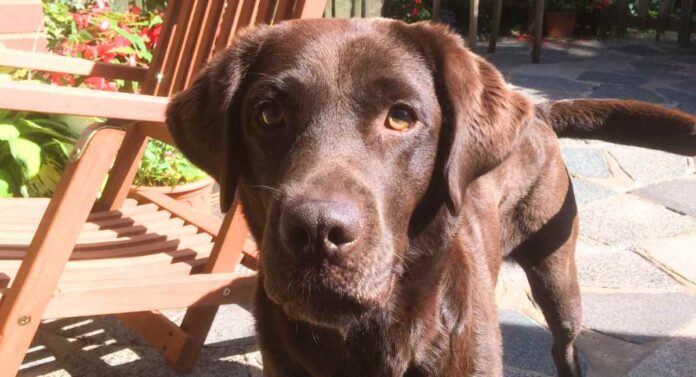
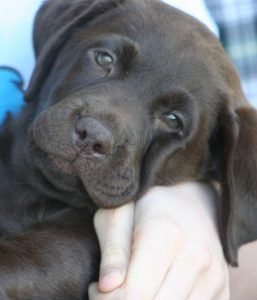
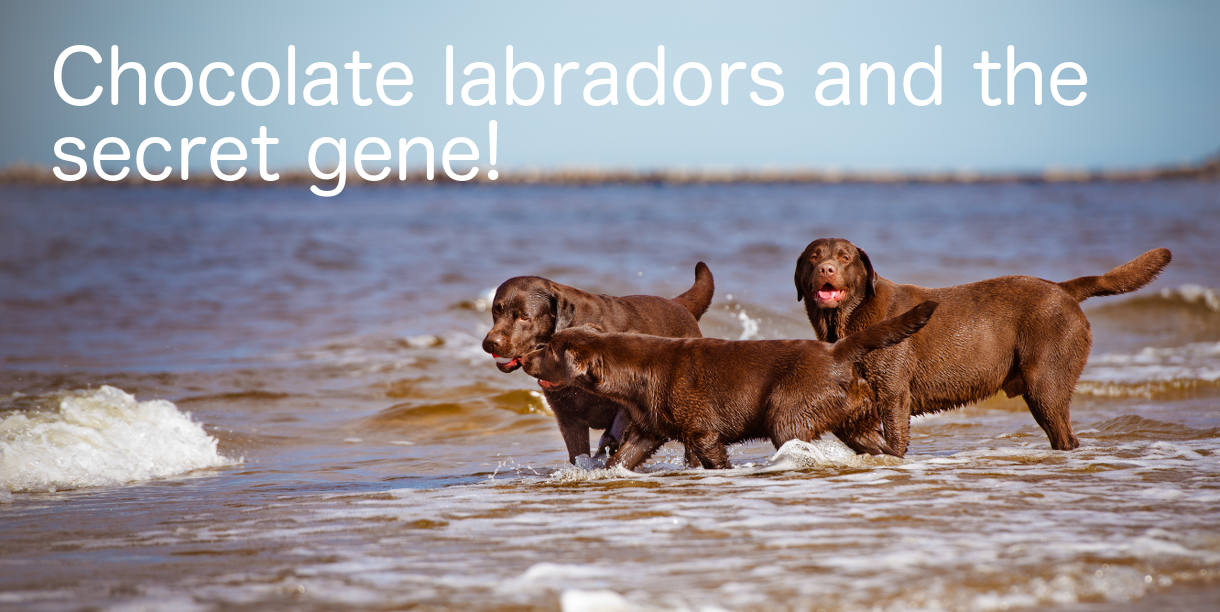
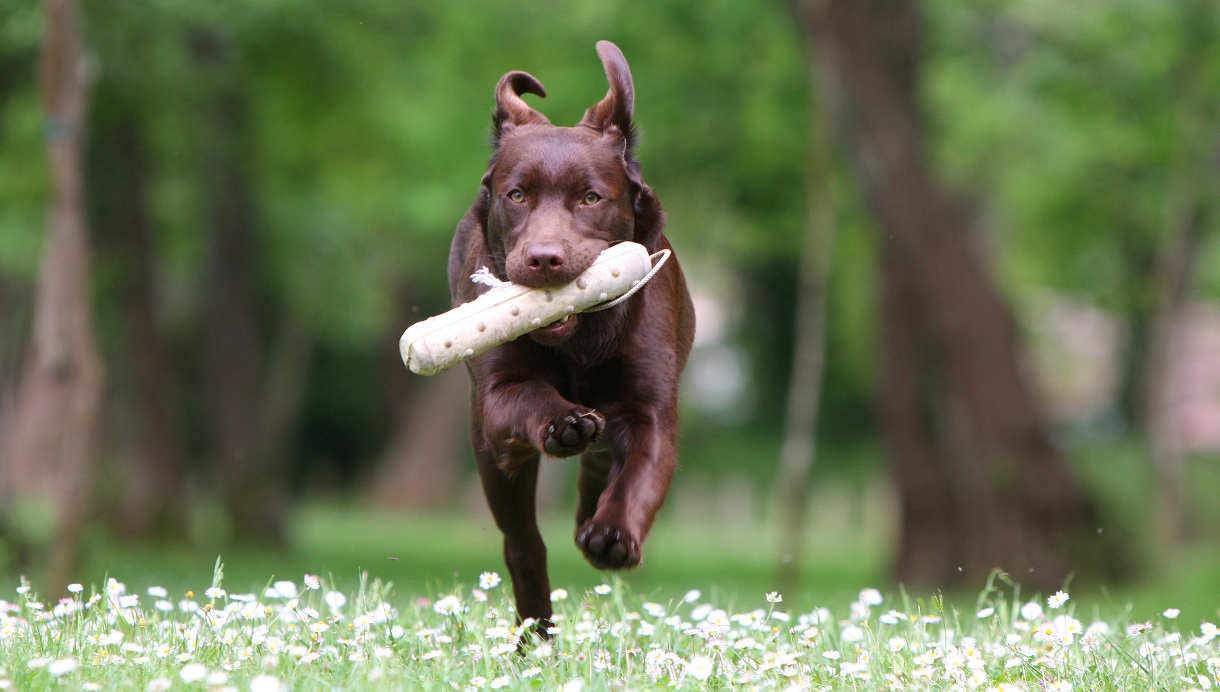
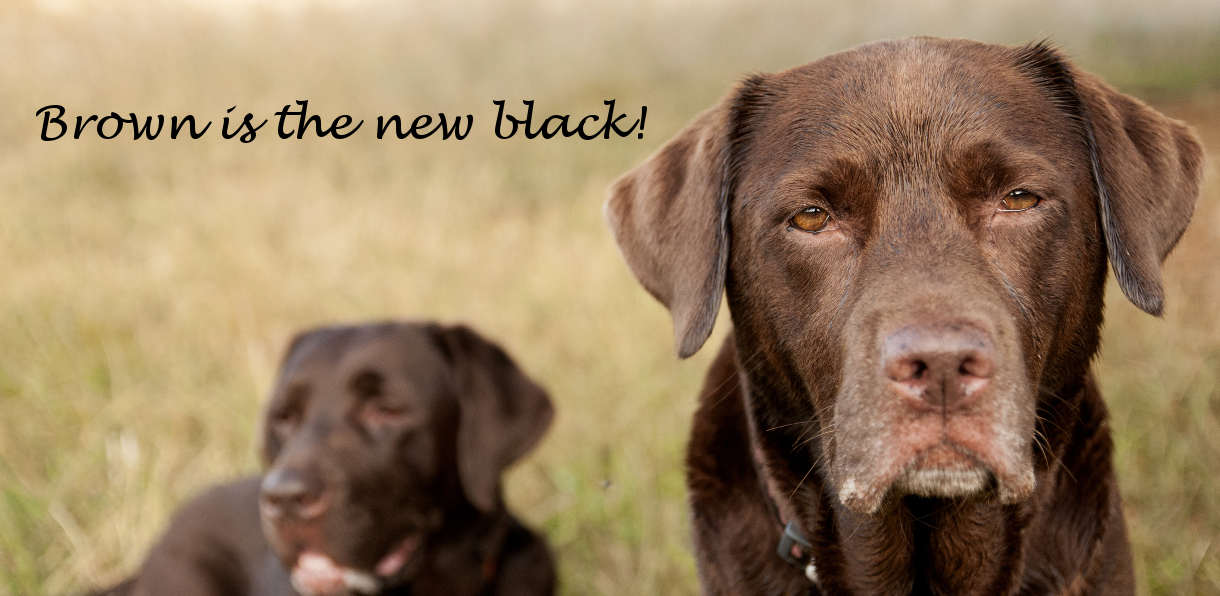
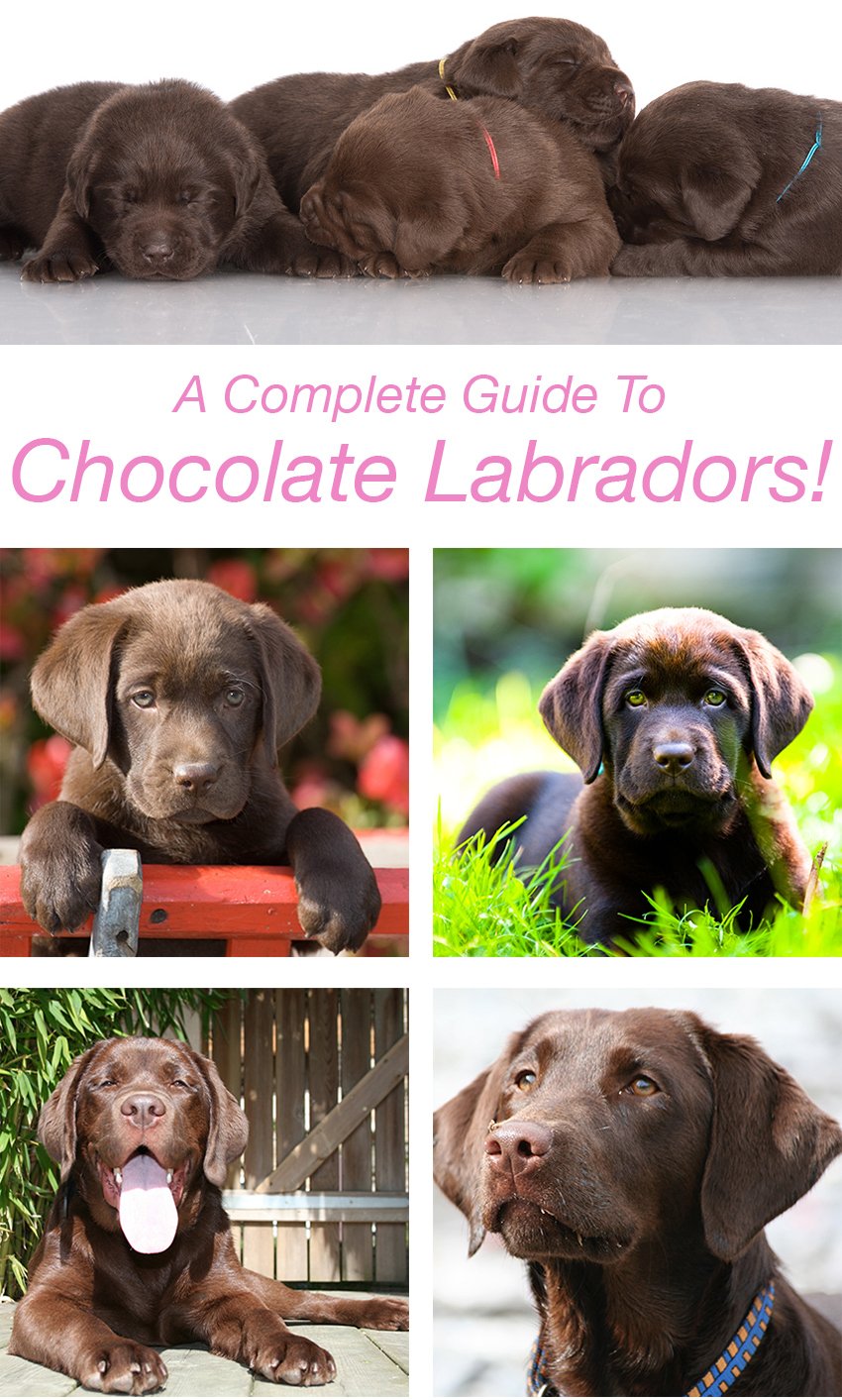
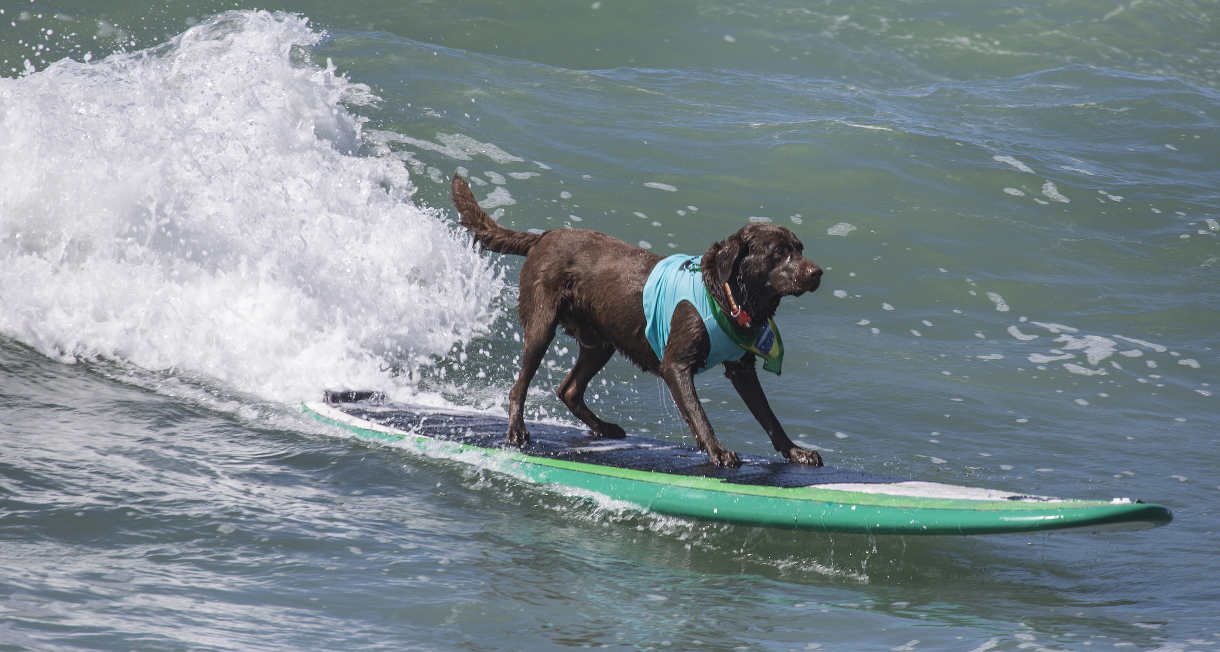
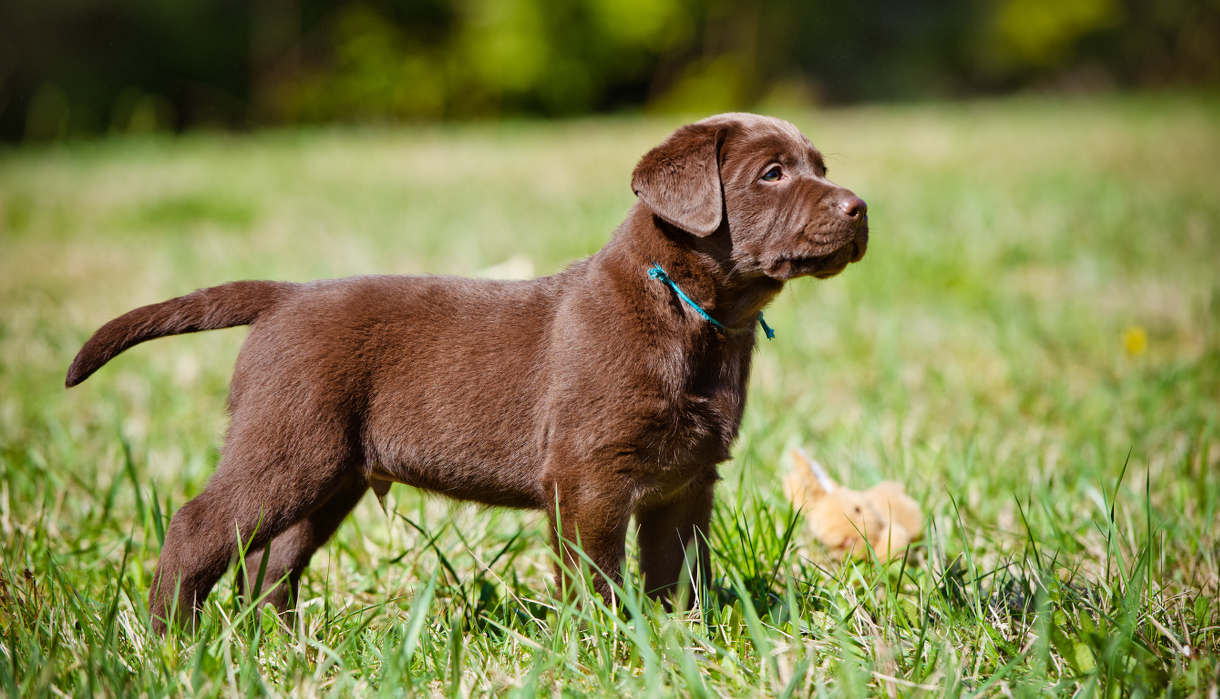


















We fell in love with our chocolate lab instantly. How can you not?
He is now 1 yo and barks constantly for attention and wants to play all the time. It is hard to give him constant attention throughout the day, especially evenings (we still need to do stuff for our young kids, cook, clean, homework, etc etc).
My heart aches when he barks.
His barking is annoying the neighbours. They have complained. My kids live in fear that they will demand we give him away.
Please, any advice to curbing his barking? (Hanging anti barking noice devices do nothing for this choc lab.)
I’ve spent thousands on puppy school, daycare and obedience training but barking for attention continues. It’s only barking for attention. Even after waking him, playing with him.
If I ignore him and then there is a good period of time of him not barking, if I reward him with a treat he thing starts barking again.
Quality of life is slowly going down. Need sleep and some quiet time.
He is super cute and smart and we love him.
Hi Milo, There are a couple of guides that I hope will help you. This is a training technique for reinforcing quiet behavior, and this is a guide specifically dealing with night noise. Fingers crossed for some peace and quiet soon!
We have just adopted a chocolate labrador called a Riley from a family who bought her during the Covid-19 lockdown. She was their first dog and was not really trained, however after six weeks she has totally trained us. She was overfed and under exercised, consequently to her displeasure she is on a strict diet needing to lose about 20lb. She is a pleasure to have around.
I have a beautiful 9 year female, rescued from an abusive family about 7 years ago. She has that beautiful 2 tone coat, the chocolate shade almost sparkles in sunshine. She is amazing, so very smart. I noticed some posted questions about training, my dog almost seems self trained, she just knows good behavior, is very social, and easily can go most anywhere off leash. I know I’m gushing about this dog, but it’s all true. When we rescued her I had two older Goldens, which I’m sure was helpful. Just over a year ago we adopted a rescue puppy, part Doberman, and I have witnessed the leadership the lab provides to the younger dog and the development of a strong bond between the two dogs. As a long time dog owner I cannot say enough good things about chocolate labs.
I would love to know more about how people have trained their chocolate labs to surf. That picture in the article is really cool, and I’m wondering if I should take one of our pups out on the board to see if they can hang ten!
My dearly-departed wife picked out our chocolate and she couldn’t have made a better choice! When the rest of the litter went out to play, Zoey got in their feeder and ate as fast as she could. The only problem there has been with her blood line has been cancer and neurological problems. Her uncle died of a stroke, and Zoey lost a leg and part of her jaw to cancer. The vet was honest with me (my wife had passed on by that time) about her possible future with cancer, but so far, so good. Zoey is smart, extraordinarily friendly, and a dear soul. I don’t know what I’ll do if and when God brings her home to be with my wife.
I have a chocolate lab and he is 2.5 years. He is absolutely sweet with people and a great companion. He is our second dog. We got him when he was 8 weeks and our eldest dog ( a peaceful Golden retriever) was 8 years old. Unfortunately when he was 1 year old he developed an aggressive behaviour towards other dogs which prevent us from taking him off leash to the trails where we used to walk. We do not understand where this aggression comes from and how to help him overcome this behaviour. He has been trained but this behaviour was not fixed. I would very much appreciate your support. THank you
We have a rescue/ adoption chocolate lab. Kira has been with us, now six months and you are all so right, she is the joy of our lives. After losing our black lab after 16 years (yes, 16 years) Lady left a huge hole in our lives and hearts. We contacted our rescue /rehab group here in Nashville (Lifehouse Rescue and Rehabilitation) after a few months of grieving, and knowing that only a lab would do, these wonderful folks found this beautiful, sweet, super smart and very, very affectionate 2 1/2-year-old chocolate lab for us. A tornado displaced victim we suspect. My wife and I are now retired and able to spend allot of time with her, and she has responded as labs do, lots of kisses and so much affection. She goes everywhere with us and gets lots of attention ” what a beautiful dog ” is what we hear frequently.
Knowing that the breed has a tendency to get heavy, I would ask for advice on quantity and frequency of food. She is on Purina One and 2 1/2- 3 cups total per day ,1 1/4- 1 1/2 cups twice a day with 7 oz of wet food with the evening meal. Any help or suggestions would be very helpful. We want her to be happy and healthy as you all do with your dogs.
Dear Rhyl, Please continue to do everything you know how for Maloo. Our dog juju was given 3-6 months after her oral melanoma diagnosis. We fought back using radiation, a fresh food diet, not kibble, and filtered water. After a year she is still here, living her best life with no cancer in sight.
we adopted our chocolate female lab, Jesse, when she was 5 years old. she lived 16 years and 3 months. she was the most loyal loving dog ever. She was always ready for her walks, very protective of us and the house. she would chase the neighborhood dogs down the street, including a 150 lb mastiff (even though she was only 55 lbs herself). everyone loved her. i wish that she could have had puppies as i am now searching for a chocolate lab puppy just like her. it won’t be easy to replace her, but it will be so good to have a new puppy soon. hoping the search ends soon and we can continue with the good times brought to us by her and her brother. Jake & Jesse. always in my heart.
I loved your post about your Jesse. I was looking for a black lab puppy in 2019. I found a breeder that I wanted to check out. I took the hour+ drive to check him out. He had one chocolate female (15 weeks old) left from a litter and had another litter of chocolates due from another of his dogs in another 8 weeks. I asked him when he would be planning a litter of black pups. My son got a black male from a different breeder that he raised and guinness was 13 by the time I decided I wanted a lab like him. The breeder said he wasn’t planning a black litter but showed me this chocolate female. Initially I said I wanted a pup that was just old enough to leave her mom so I could train her from the get go. However, during our lengthy conversation, i was standing in a gated area with this 15week choc female. The longer I looked at her, the more my heart strings were pulled. She wasn’t jumping at me or trying to lick me she was shy and just kept looking into my eyes……showing none of the things you are told to look for when choosing a puppy. Eventually we made friends and I can’t say exactly why, except my gut told me to take her home. I did exactly that. Because of her beautiful green eyes, I called her “Olive”. Olive will be 3 in june. She is hands doen the best dog I have ever had. My HEART DOG, she is very protective of me and even checks on me during the night several times, she is amazingly intelligent and does whatever I ask her to do immediately. She takes a few minutes to warm up to strangers but once she does, she remembers them like family whenever they come over or we seem them elsewhere. She is a pro at fetch, and she even helped me train the black lab pup I got the following year.
Olive will gaze into my eyes intently when she wants something and when I return her gaze she will tap my cheek lightly with her nose until i guess what she wants.
She is obedient, very loving, gentle, smart & protective. We have a connection that is both amazing and unbelievably special. A gentle english giant at 103 lbs. there is no doubt in my mind that we were meant to be together.
Incidentally, my black lab pup is 2 now, i also love her immensely. She’s energetic, goofy and licks everyone and Raven and Olive are best buddies. As Raven gets older she is becoming more like Olive in some ways. I feel blessed to have them both and our connections are wonderful. Yet with my chocolate Olive there is something profoundly special about our connection.
I am relieved your Jesse had such longevity after reading that their lifespans are averaging 10.7 years.
Thank you for your story. I hope mine isn’t too too long
Our adorable chocolate Labrador, Maloo, is extra precious to us as she first belonged to our beloved daughter, Kari-Lee, who died aged just 25. Kari was in and out of hospital for most of the 10 months that she shared with Maloo, as she was waiting for a double lung transplant. Every day she would drag herself downstairs to spend some time in the sunshine with her precious “fur-baby”.
After Kari died 7 years ago now, Maloo became our comforter and entertainer, a living link to Kari. She is the most friendly, loving, sweet and silly dog you could ever wish for.
Last week we received the devastating news that Maloo has aggressive, terminal oral melanoma and probably only a month or two to live. It’s impossible to believe, especially as we watched her leaping and frolicking in the surf yesterday. We are still coming to terms with this heartbreaking news and doing everything we can to give her the best, longest, happiest life possible.
I know that you fellow chocolate Labrador owners will understand how incredibly difficult saying goodbye to Maloo is going to be.
Wow God bless
I have a 4-year old female chocolate named Lena. She is the sweetest, most affectionate dog ever. She smiles, gives kisses, gives hugs. Every where I take her, I’m told how pretty and sweet she is! She is often the bell of the ball. She wears her emotions on her sleeve, it’s easy to tell what she is feeling. She gets depressed watching me get ready for work, as an example. I don’t believe I will ever have another dog, another could not compare!
Our Black Lab/Heeler mix died in October and we were devastated- Rosco was the vest dog ever! for a few week I thought I would never get another dog because I couldn’t see how anyone could replace Rosco- but, within a few weeks the house seemed so empty with just the two of us and we started looking at other dogs. We didn’t want a puppy since we are both seniors- but saw and ad where someone wanted re-home a 2 1/2 year old Chocolate Lab, and we knew we wanted him even though he does have some allergies/skin problems. Farley is fairly big and the biggest toy destroyer/mooch/bed hog that we could have. He actually chewed one of the legs of a chair almost in half! he has gotten better but it is hard to find toys that he doesn’t destroy- fortunately my son is a hunter and has given him several pieces of antlers… and his favorite toy is a ‘babble ball’ that talks and so far has survived his chewing. He loves going on walks and ‘dad’ takes him to the dog park almost daily where he can run to his heart’s content..We are lucky we a fairly large fenced yard also. To try and deal with this skin problems we bought a humidifier (ti tis very dry here), a Heppa air cleaner and I make most of his food- he also gets lamb/brown rice dry food and some anti-itch medication and salmon oil- he appears to be scratching less but he still has some bald spots but we love him, he’s a sweetie.
Silver Labradors are not accepted for registration by all Kennel Clubs. In fact, in New Zealand, in order to register a litter of Labradors with the NZKC we have to DNA test for the dilute gene! The only reason they are registered in America is because their breeders falsely registered them as chocolate.
When I was young my parents also had a chocolate brown labrador. Since a few years when I started working I got the opportunity to meet my best companion Max, a chocolate brown labrador. As I’m working in the iGaming industry I have to attend quite a few events during the year. Since last year most events made a change by going online. This way it actually allowed me to work fully remote. I’m still enjoying every single (long) walk I’m making with Max on a daily basis.
I absolutely loved reading this article. You hit the nail on the head when you said there is just something special about a chocolate.
About a year and a half ago my husband and I found out that due to infertility issues, we would be unable to have children (after 5 years of trying). We got our Chocolate Lab, Jarvis, shortly after that. He has been my rock, and the comic humor I needed in my life during a difficult time. There is just a special bond between the two of us. I never thought he would be “my dog,” but he completely is. He loves his dad don’t get me wrong, but him and I share something sweet. He is my baby.
We adopted our Chocolate Lab from a no-kill shelter in Las Vegas. The dogs are housed with prison inmates and the dogs get to train their humans, even as their humans are training them! Name of the shelter is Heaven Can Wait. It is a wonderful, win-win situation for all involved. Well, DiMaggio is extra attached to his adoptive human mommy, me. I just love his independent spirit and exuberant love of life. He is a Chocolate Lab-German Shepherd- Mastiff (perhaps Great Dane or Pitbull) mix and was hard to train at first. His weight, when lean is 110 lb. He spent at least a year or more, as a puppy, in the shelter, before he found his forever home with us. Such a character but don’t be fooled by these lovely beasts, they often become hard to control, on walks, if training is not re-inforced, daily and Labs have been know to become problem dogs, if not trained properly. You have to have the will-power to commit to training a Lab until he is out of puppyhood. They take 5 years to grow fully. If you spend time with them, lovingly reinforcing training on a daily basis, then you will have a friend like I do now! He is so spoiled that he has his own bed (human bed) and often climbs under the covers! He also loves to wear my husband’s old golf shirts, which we have adapted to fit him. He even performed a type of massage, with his mouth, on my leg, as it was healing, after being broken. I have issues with my lymphatic system – so my legs become painful and swollen. DiMaggio, without being trained to do so, came and nibbled along my pressure points on my legs and the pain would leave my legs, swelling improved, also. Labs take care of their people, so take the time to spend that extra time to make your Lab, a member of your family. They are not dogs, in my opinion, they are little people in fur suits! Such beauties!
Our chocolate lab, Rudy, was one of a kind. We gained him when our son got married. Every day he amazed us. Rudy quickly filled our life with adventures and too many stories to list. For the 10 years he lived with us we knew unconditional love, loyalty, and friendship. He had a stroke and we had to say goodbye 2 weeks ago. While we know Rudy can’t be replaced we will find another lab to love, soon.
I have learned to never say “Never”.
Mine was a gift for my 5th birthday, we were both so young and energetic. I never saw him growl, bit, or bark at anything during his whole life, never even showed his teeth. My dad was the leader and Charlie and I were his little helpers. We did everything together, he was like another son to my father and he was the best friend I ever had and I miss him more then anything in life. Love them while you can, because it feels like death when they have to go.
My dog Charlee Rose was the sweetest dog ever!!!! She just passed away at 16 1/2 years. I am so thankful I was able to have her so long. She is a true fighter. She started to show her age at 12 and I was scared I would lose her many times. God granted her so many miracles. She had 9 plus lives. More than one of her sister cats had.
My husband loved Labs and I did not see it. I grew up with hairy Collies. I thought a dog was a dog no matter what breed and Hairy dogs were cuter. One day my brother in law showed up with a 3 month old Chocolate Lab. His neighbor upstate New York had puppies. My husband said “I want a Lab!” I said go get one.. Two days later he brought home our Charlee Rose.
We bonded as soon as we met. Her goal was always to please me and my family. She was the easiest dog to raise and the sweetest dog ever!!! I fell madly in love with her right away and everyday I was so grateful for her and could not imagine having any other dog.
Everyone who met her agreed. My neighbor got her first dog ever because of her.
My husband was right. The temperament of Labs is unmatchable. We eventually adopted her niece four years later. She is a black lab.
I could go on and on about her. We miss her dearly but are grateful for being blessed to have her in our family and for that amount of time.
We just recently purchased a choc. lab back in march. He just turned 11 months old, 75 lbs at this point and is turning out to be a real character. We also have an 11 yr old blk lab that has been an absolute joy to have. Kevin( choc lab) is definitely energetic and almost over friendly to everyone he meets including other dogs. It has been a challenge to get him to stop jumping around when visitors come over, but he does settle down and goes with the flow after initial contact. Both dogs are very social and love to play and retrieve. Think we would be hard pressed to find a more enjoyable and lovable breed of dog.
I have had a yellow lab that we lost to cancer but he was 9yrs old! We got him from a co-worker at the age of 4 he was my best friend. Till my wife surprised me for my birthday one year, about 3yrs after loosing my Buck, that was my yellow lab. She got me a chocolate lab (Bear) and he reminds me of Buck and in some weird way acts like Buck. He is now my best friend. He loves the dessert and woods. Love to chase his tire!
My chocolate labrador was just the best dog ever. I could truly write a book on him. He was just amazing. He left us on 23/07/21 aged 14 years and 1 month. He didn’t get bad arthritis. He could still hop in and out of our back door the morning of the day before he died and the day before he died he could still jump onto the back seat of my car with just a bit of a leg up from the back from me. Just an amazing “Captain Tom” lionheart of a dog who was going for his two walks a day come what may. If ever I worked on too long into his evening dog walking time he would come up and put his head under my laptop and knock it upwards to say: “That’s enough working! Put that thing away! It’s time to walk!” And as for his: “Are we nearly there yet?”, dog barking when we were barely a mile down the road! 🙂 Davy you are with us always mate. My unique, special dog. Thank you for staying with us as long as you did – at one stage we weren’t sure you would even survive the first year of your life as you were always getting into fixes. Yet here we are. You made it to 14 years and 1 month. Our love always Mum and Dad and your human and canine family xxx
I love my chocolate lab puppy. His mother died 2 weeks after she had him. We named him Larry. He is so sweet. I am bottle feeding him right now. I love him.
My Chocolate Labrador Kobe has changed my life for the best ❤️
my 1 yr. old choc. lab female is very smart and loves to fetch. ( she is in her 3 week of heat)She walks beside me in r fenced yard and doesn’t. However, if she sees a bird she is running!!! She is 85 lbs. and I hav to let go of the leash! This would b a big concern walking outside the yard.She was diagnosed with growing pains a few mo. ago. Which I was told that it is as painful as a broken leg. I believe she is much if not all better. I am concerned when she is possessive aggressive, food, kong wrong thing in her mouth. she growls and her eyes say stay back i am mad. she has been better but she did longe bite the vet technician. She removed the muzzle and cut 1 of her nails to short. She no longer sleeps in her crate. That’s fine cuz she sleeps on a rug in bedroom and does not do anything wrong and I keep items out of reach. She has gotten mad aggressive when a friend petted her and longed to bite. I was walking her don’t know if she got stung or i didn’t giv treat soon enough so she growled jumped on me bit my hand both sided and my upper arm. At nite she sometimes gives that mad look and my son and husband notices and we stay away. This is heartbreaking to all of us cuz we have had her since she was 2 mo. No one has been mean or ever hurt her. I was told labs r aggressive and and r listed as the number 1 dog to bite. Is this true? Will it go away after spayed? I tell her no sit . I was rubbing ointment on my husbands arm she growled lunged I backed up told her no bad. She still showed quivering and upper teeth. I told her very stern no and my facial expression showed i not happy! I tak her for rides she now barks @ people on occasion but not like before. I took her for a ride backed into my garage opened her door told her come. She did not want to soitook hold of leash told her come she did and jumped at me growling. Each bad time i ignore her for 45 min. no eye contact either. I tried Call Allen Yoder breeder and he disconnects the phone. I just wanted to tell him that we love her so and wondered if the parents or other pups had aggressive behavior or and growing pains ? I hav had costly vet bills now going this month to another highly recommended vet check her out to b spayed cut her nails and brush her. Then mak app. for spaying. Will she b better behaved after spaying?I got her as a family pet let my son me husband bond. My son was very ill almost lost him 3 times promised to get a dog and that helped him through his sickness. i fetch hav trainer for months. She great happy smart he can’t believe about these incidents. We hav above ground pool had a dock made she likes kiddie pool and is close to going in bigger pool loves being on the deck. I hav always had great dogs cats etc. I am energetic spend almost all my free time with her till 8pm then my son and husband enjoy her and i go to bed. Please share ur expertise with me and help r Bonnie and family. Thank You God bless.
We are at retirement age and our Chocolate Lab Angus is now 8 months. He is such a blast. We love to watch his personality show through his actions. We bought him from a breeder in north TX and have found him to be healthy, fun and loving. He loves his cuddle time in the mornings to get his belly rubs. Recently he has been testing the rules to see if they still apply. His expressive eyes make it so hard to discipline him. I have heard from some that this is the age like the teens and testing time? We find he loves routine especially his bedtime. There isn’t a mean bone in his body but his way of telling me he needs to go out is to try to nip at my hands. He does use the bells hanging on the door however sometimes we don’t respond fast enough in his eyes. He loves to socialize with the neighbor’s dogs, there is a sleek bag lab named Zote, A German short haired pointer named Pasquale and then there is the new girl in town long legged blonde Phoebe a Golden Retriever. We so enjoy sitting on the front porch watching them all socialize. Thanks for all your information love reading and learning the training tips since Angus is our first pet. We wanted to offer a pet a home with owners at home.
We lost our 13 year old chocolate lab, Tilly, last summer – we were all heartbroken and she left such a huge gap in our lives. She was gentle, loving, loyal, fun and gave us years of pleasure and companionship. So much so, that we have now welcomed Mila, now 10 week old chocolate lab.
I am currently sleep deprived, training her to go through the night slowly – can go 4 hours now – lots of the comments ringing true (biting/chewing, playfulness etc) but pure joy. Currently working on increasing periods of separation from me, so she does not constantly have to be by my side, and so I can go out for short periods!
We have a 3 year old chocolate lab called Cash, he has a lovely temperament and loves everyone equally in the house including the cat 🙂
He really does love meeting new people and dogs, which can be a problem when he is off the lead as he just wants to run and say “hi” to everyone.
Not sure if I should try and stop him, or just accept that he is Über friendly. Any thoughts anyone?
Lovely article, informative too. I henge an 8 year old chocolate lab named Coco… She is the best companion and I love her dearly. Thanks for sharing your knowledge. J
Have! Not henge… 😉
Shadow, my Chocolate pup is every bit as rambunctious (read” bite crazy and destructive”) as the breed is noted for being. But He is also loving, very bright – and STUBBORN! I want express my deepest appreciation to you, Pippa, for the information provided in your website. You explained that the behavior my wife and I experienced was normal and not evidence that we had gotten a “demon dog”, as we had first suspected after 2 weeks in which we caused Band-Aid stocks to rise precipitously. Your explanation of what was normal, why Labs do what they do and what could be done about it was right on the money – far more so than other books by supposed experts. (We may have been spoiled by years of English Black and Yellow Labs who were far more docile than our American one. Don’t know if Chocolate factors in.) Thank you for that vital information.
After losing our 18 year old dog in November, we have just welcomed an adorable chocolate lab puppy to our family. Taj is now 11 weeks old & he has stolen all of our hearts (and slippers). We have taught him to sit, progressing with toilet training, doing crate training & attending puppy pre school. Any advice on the constant chewing of our hands & toes? We are giving him lots of different chew toys- both soft & hard, playing with him, etc
This is such a great site. Very, very informative and helpful for those is us with Labs. I have a new black Lab puppy, with a Chocolate joining our home in two months. This site really answers a lot of questions that help us know how to raise our new family members appropriately! Thanks!!!!
Our beautiful chocolate bear, Murphy, left us in February this year, to say he left a very big Murphy shaped hole in our lives is an understatement, the moment he came in to our lives on Boxing Day 2005 he brought nothing but love and laughter, he was the most amazing laid back gentle boy you could ever meet, he was a big lad, but not overweight, didn’t like water and preferred sleeping for 23 hours a day, food was VERY important, he taught us so much about unconditional love and loss, we miss him every day, we always will, but he had a truly amazing life and we have now welcomed our new addition to the family, chocolate lab puppy Charlie, 11 weeks old already and a bundle of fun, and so our journey begins again, with Murphy ever present in our hearts
❤️
We lost our 12-year old several months ago and it has left such a hole on our hearts. We now have a new Lab puppy with another scheduled for several months from now. I know our 12-yearly would be happy to know these new labs will get the unconditional love we gave her for all those years.
Our Lottie is about 6 or 7. She was tied up to a post with a sign at about 5 months. She is by my side day and night. I think we love each other equally. She loves to retrieve the newspaper in the morning. She will crawl in my lap to console me if I am the least bit upset like paying bills. On the top of her head by her ears are almost gold colored pads I am curious about these.
dogs are the best not nut-hay
My 5 year old chocolate lab(Rachel also lol) is such a sweet girl. Golden labs are so popular, and there isn’t many chocolate labs, so people always stop to admire her. We are getting a new puppy(chocolate lab who’s names will be Daisy) tomorrow. I absolutely love labs and understand why they are so popular! Thank you so much for writing this article, it was a great help to me!
My chocolate lab pup is 2 1/2 yrs. Her name is Lucy lue. Lucy after th actress Lucy Ball lue after a sweet friend of mine take 2 soon from Diabetes. Lucy is th sweetest, Friendly, loving, caring & more. Beautiful coat. Just struggling with th come bck, stay. Other wise Lucy does great. Very smart.
My daughter bought a chocolate lab puppy a month ago from a breeder. This adorable puppy has quite a few white hairs sprinkled on his back and now a few on his head. His coat has changed from brown to nearly black, although his ears are the original color.
Is this normal?
My new Chocolate Lab has the same. I just got him. He is around 3.
I have 2 companions “The Girls” a Weimaraner and a Chocolate Labrador. They were born on the same day. The Chocolate Labrador runs our house and despite of the Vets warning in in charge of the Dog relationship. No snarling, barking or threats just a look that would occasionally bring the Weimaraner back in line. Those days are well past us now they live in perfect harmony. We have never heard her “Pickle” bark. She yodels at night in the Garden to let the World know she is about and Puffs by blowing her cheeks out if annoyed or demanding a walk, treat, food, seat, attention the list is quite long. Ever listening there are not many words she doesn’t know. We love both dogs equally and have had Labradors before. Chocolate not intelligent is a nonsense – smartest dog we have had.